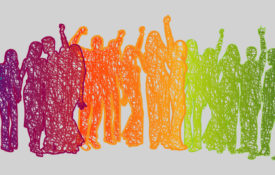APS Statement on Diversity, Equity, & Inclusion
The Association for Psychological Science is committed to promoting diversity, equity, and inclusion in all areas of our leadership, membership, activities, staff, and field. Including members of underrepresented groups in meaningful ways is a vital part of this commitment. Acknowledging the harmful roles that racism and other forms of discrimination and exclusion have played in all aspects of society, including our field, is critical in order to turn this commitment into action. This includes investigating potential consequences within our own organization.
We fully embrace the guiding organizational principle that psychological science has the ability to transform society for the better and can and must play a central role in advancing human welfare and the public interest. To that end, we support the pursuit of a wide variety of scientific work that furthers our understanding of the causes and harmful effects of racism, stereotypes, and inequities; the psychological and societal benefits of diversity, equity, and inclusion; and the most effective ways to foster these outcomes and advance a more just and equitable world.
Diversity, Equity, and Inclusion Committee
Binghamton University, The State University of New York
Pontificia Universidade Catolica, Rio Grande do Sul
Alfred University
University of Minnesota
New York University
University of Amsterdam
North Carolina Agricultural & Technical State University
Public and Media Engagement
Roundtables:
- The Psychological Science of Racism: Expert Panel
- Policing and Racism, Insights from Psychological Science: Expert Panel
Podcasts:
- Racial Disparities in Drug Intervention: Culturally Inclusive Approaches
- When Versus Whether: Gender Differences in Leadership
- Community Engagement in Psychological Research
- Linking Developmental Delays and Parenting Strategies with Inclusivity in Mind
- Loneliness Across the Globe: A Life-Span Approach
- Neil Lewis Jr. on the Unequal Nature of Society
- Traffic Stops and Race: Police Conduct May Bend to Local Biases
- Gender in a Nonbinary World
- Casual Sex, Self Esteem, and the Prejudices Women Face
- A Psychologist’s View of Racism and Inequality
- The Story Behind “The Future of Women in Psychological Science”
Webinars:
- Academic Burnout and Imposter Syndrome
- Barriers to Access in Mental Health Services
- Helping Underrepresented Populations Through Community-Oriented Research
- Applying Psychological Science to Educational Policy and Practice: COVID-19 and the College Admissions Process
- Marginalized Graduate Student Survival Kit
- National Research Mentoring Network Resources for APS Members
- Eyewitness Error: Malleable Memories, Flawed Legal Processes, and an Opportunity to Learn
Students
- Funded 11 APS Student Members to participate in training as Wiki Scholars with the specific goal of adding information about Black psychologists to Wikipedia. As of May 1, 2021, they had added entries, edited 17 Wikipedia articles related to psychology, especially Black psychologists, and added 16,700 words to Wikipedia and 129 references/citations. The articles they improved reached 45,900 readers in the first month since the project ended.












